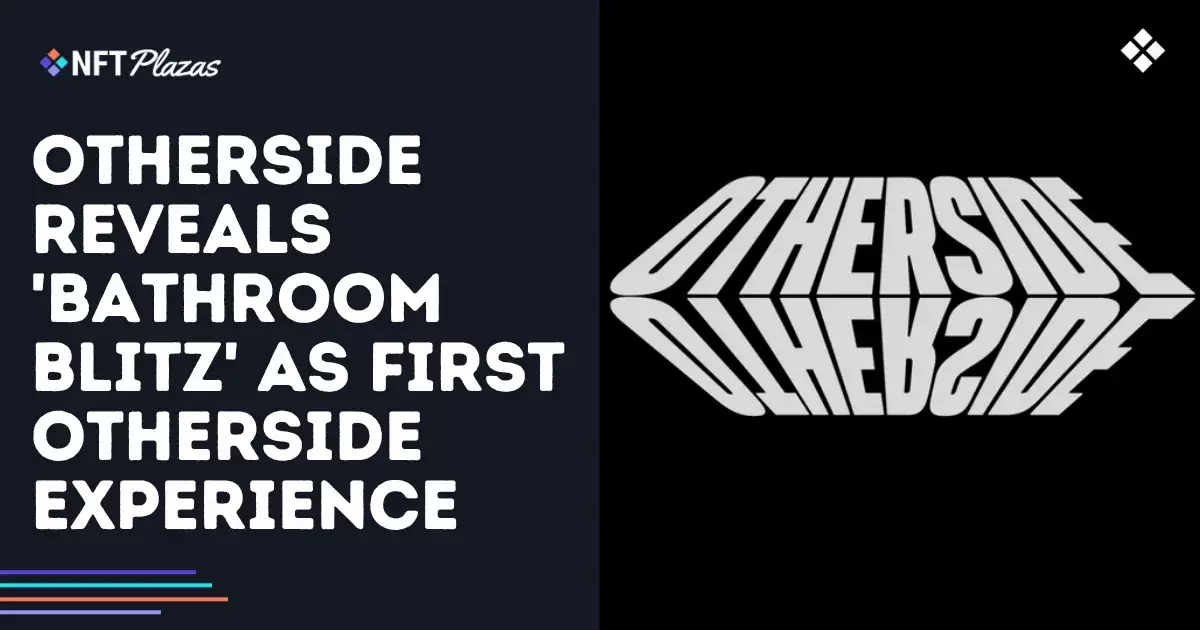Yuga Labs’ latest venture, Bathroom Blitz, promises a frenetic multiplayer shooter experience set inside the iconic BAYC bathroom—a digital homage to one of the most recognized NFT projects. On paper, it’s a clever synergy of gaming and NFT culture, but beneath the hype lies a series of uncomfortable truths about the Otherside metaverse and what this launch signifies for the broader blockchain gaming ecosystem.
Bathroom Blitz isn’t just any game; it’s Otherside’s inaugural persistent virtual playground venturing beyond isolated experiences into an “always-on” world. The ambition to glue players into a continuous online space with real-time engagement has excited fans but also raised skepticism. Persistent virtual environments have historically been tech and resource-intensive endeavors, often plagued by scalability issues and shallow gameplay loops when rushed. Launching a high-octane, 8v8 shooter in such a space, especially within the constraints of BAYC’s themed bathroom, sounds more like a testbed for infrastructure than a fully fleshed-out game designed to captivate long-term.
Voyager XP: Innovation or Token Gimmick?
An intriguing addition to Bathroom Blitz is the Voyager XP system, intended to reward users for active participation across the platform. While progression systems are universally welcomed in competitive gaming, integrating them into blockchain ecosystems is fraught with challenges.
Voyager XP appears poised to become a yardstick for engagement, but it also teeters on the risk of commodifying player attention. By tying progression and rewards to persistent activity, Yuga Labs nudges players towards time-intensive behavior—often echoing patterns seen in less sustainable free-to-play models. The danger here is that engagement metrics might prioritize quantity over quality, incentivizing grinding rather than meaningful gameplay or community interaction. Moreover, embedding such XP within blockchain infrastructure obscures what genuine value players will receive versus mere tokenized points with uncertain usability outside Otherside.
Social Hubs Go Big—But Is Bigger Always Better?
In tandem with Bathroom Blitz, Yuga is expanding social areas like the Clubhouse, rebranded as Meet Me at the Clubhouse, increasing concurrent user capacity fivefold to 500. This attempt to foster a bustling virtual social scene is admirable; however, scaling social environments comes with its own pitfalls.
Rather than being a sign of confidence, massively increased lobby sizes may reflect an underlying challenge: how to maintain genuine community connections when the crowd swells. Critical voices have long argued that metaverse social spaces often lack depth, converting human interaction into sterile, noisy hubs where meaningful exchange becomes lost. Increasing capacity might instead result in a fragmented environment where users struggle to find anything but background chatter, defeating the purpose of intimate community bonds central to BAYC’s original ethos.
Content Creation Democratized—With Strings Attached
Perhaps one of Otherside’s more commendable initiatives is handing development tools and thousands of in-game assets to creators and Otherdeed holders. By opening up creation through emotes, stickers, and custom objects with built-in royalties, Yuga Labs taps into decentralized creativity and potential monetization.
Still, this openness is double-edged. The promise of royalty systems may sound empowering but risks complicating content ownership over time. Who truly controls these assets once minted on-chain? How sustainable are these rewards if the platform fails to retain players or if secondary markets devalue creations? Moreover, the technical barrier may remain too high for many casual users despite simplified tools, meaning the lion’s share of creation could remain in the hands of a few specialists—dialing back the democratizing effect Yuga envisions.
Persistent Playtested but Unproven
Bathroom Blitz’s launch serves as a real-world experiment for Otherside’s live service infrastructure, aiming to push multiplayer concurrency and system durability. However, this iteration feels more like a fragile prototype than a polished game.
Yuga Labs is keenly aware of the risks—monitoring player feedback and performance over weeks before broader rollout signals hesitation, not unmatched confidence. Unlike mainstream gaming, blockchain metaverse projects often struggle to attract and retain players beyond initial curiosity bursts. If Bathroom Blitz fails to sustain interest amid gameplay or technical shortcomings, it could stall the entire Otherside roadmap, highlighting the precariousness of metaverse projects that bank on sustained user engagement without traditional gameplay foundations.
Yuga Labs is charting ambitious waters by merging blockchain-driven community ownership with persistent multiplayer experiences. Bathroom Blitz is at the heart of this experiment, but its potential is shadowed by challenges around meaningful gameplay, scalable social interaction, and creator sustainability. For all the innovation touted, Otherside’s path is littered with uncertainties that critics and investors alike should scrutinize rigorously. As a center-right wing liberal, my stance values both innovation and pragmatism: We must champion technological progress but remain cautious about hype cycles that inflate, then disappoint. Bathroom Blitz might just be another case where enthusiasm outruns practical utility—a fancy “bathroom break” in the metaverse that tests excitement more than endurance.


Leave a Reply